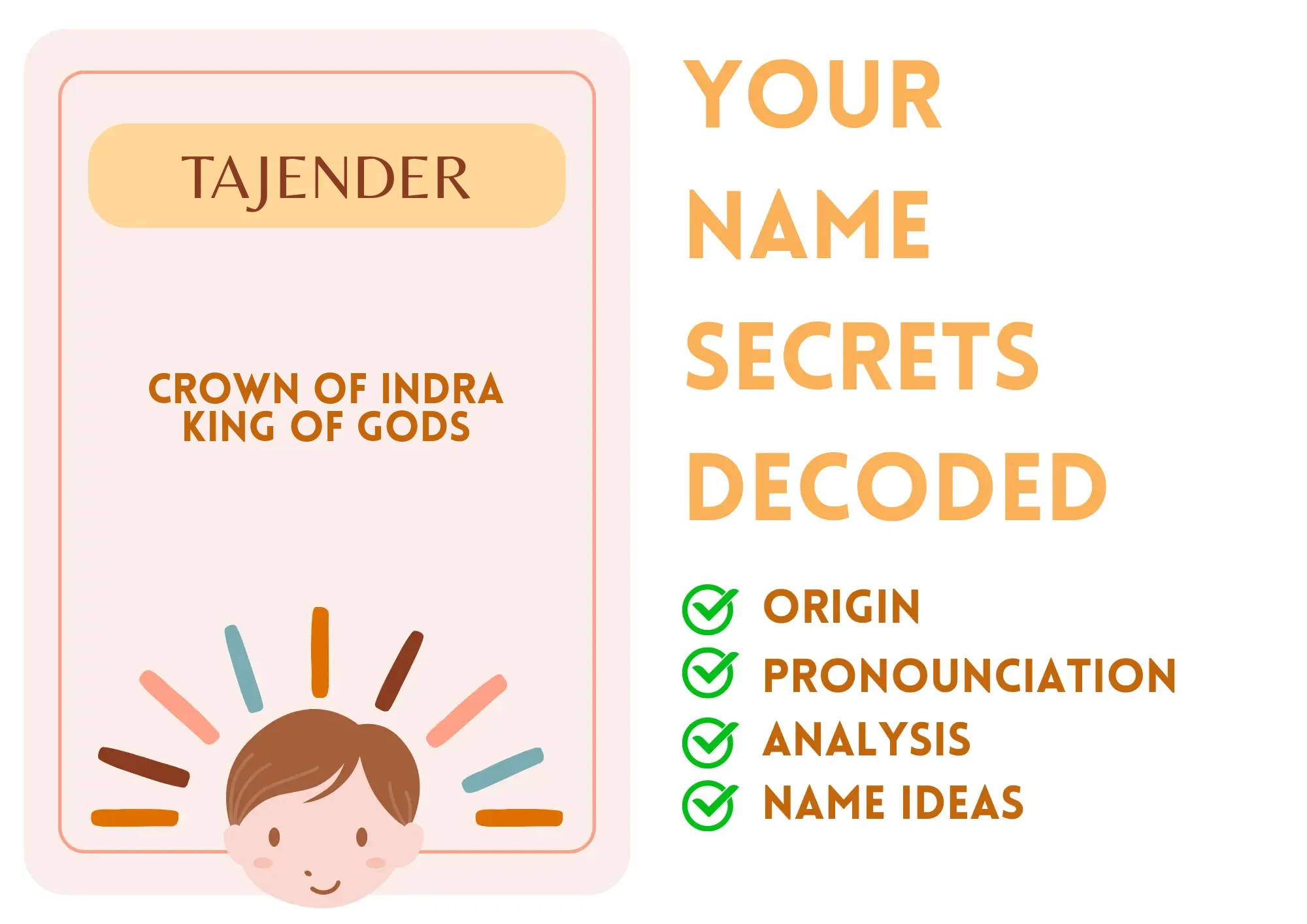
Tajender
Tajender is a culturally rich name of Indian origin, primarily combining the elements 'Taj,' meaning 'crown' in Persian and Urdu, and 'Inder' or 'Indra,' often associated with the king of the gods in Hindu mythology. Therefore, Tajender can be understood to mean 'crown of Indra' or 'king among kings.' This name is predominantly used in India and among Indian communities but carries both masculine and unisex connotations.
Tajender holds significance within Hindu culture, reflecting qualities of leadership, exaltation, and nobility, akin to divine attributes. Historically, the name symbolizes royal lineage and is used to celebrate the birth of a boy, aligning with themes of power and authority.
The name Tajender is generally well-received, evoking a strong sense of pride and dignity. It is straightforward to pronounce and write, with possible nicknames such as Taj or Jender, making it approachable for both the name-bearer and their peers.
Basic Information
Gender: Boy
Sounds Like: TAH-jen-der
Pronunciation Explanation: The emphasis is on the first syllable 'TAH', with the second syllable pronounced like 'jen', and the final syllable pronounced like 'der'.
Summary and Meaning
Meaning: crown of Indra (king of gods)
Origin: Tajender has Indian origins, influenced by Sanskrit and Persian languages.
Usage: Tajender is traditionally a masculine name, given to boys, with unisex usage being rare.
Name Number (Chaldean)
Name Number (Pythagorean)
Name Constellation (Nakshatra)
Name Zodiac Sign (Rashi)
Popularity (Global Rank)
Overall: 69231
Boys: 72681
Most Popular in
Religious and Cultural Significance
Religion: Hindu
Background: In Hindu culture, Tajender resonates deeply with the rich tapestry of mythology, particularly emphasizing themes of royalty and divine kingship.
Cultural Significance: Tajender is often chosen for boys born into families valuing tradition and noble characteristics, seen as a way to instill a sense of leadership from birth.
Historical Significance: Historically, Tajender, as part of the royal nomenclature, reflects the legacy of leadership and the divine rights associated with kingship in South Asian cultures.
Popular Culture
Literature and Mythology: Though there are limited references in classical literature, the components 'Taj' and 'Indra' appear frequently in various Indian epic texts.
Movies and Television: Occasionally, characters named Tajender appear in Indian films, often associated with themes of heritage and nobility.
Feelings and Perceptions
Perception: Tajender is generally perceived positively, carrying connotations of strength, authority, and respect. It is appreciated for its majestic and aspirational qualities.
Positive Feelings: Noble, powerful, dignified, unique, respected, auspicious.
Negative Feelings: Some may find it lengthy or complex compared to more common names.
Practical Considerations
Ease of Writing and Calling: The name Tajender is relatively straightforward to write and pronounce, consisting of three syllables which makes it easy to remember and call, despite its length.
Common Typos and Misspellings: Tajinder,Tajndeer,Tajendar
Common Nicknames: Taj,Jender,Taji
Tajender Popularity
Tajender Usage and Popularity By Country
| Country | Rank (Overall) |
|---|---|
| India | 14493 |
| Qatar | 21780 |
| Australia | 32609 |
| Netherlands | 70785 |
| Canada | 74425 |
| Germany | 81441 |
| United Kingdom | 90588 |
| United States | 186323 |
Tajender Usage and Popularity By City
| City | Rank (Overall) |
|---|---|
| Delhi | 4146 |
| New Delhi | 3846 |
| Gurgaon | 5325 |
| London | 35343 |
| Panipat | 946 |
| Dehra Dun | 828 |
| Faridabad | 2562 |
| Chandigarh | 5597 |
| Vancouver | 12900 |
| Melbourne | 23253 |
Compatibility Analysis
Famous Persons Named Tajender
No results found for Tajender.
Related Names
Similar Sounding Names:
Rajender,Sajender,Kailender